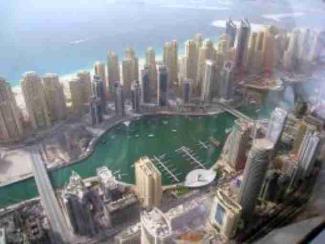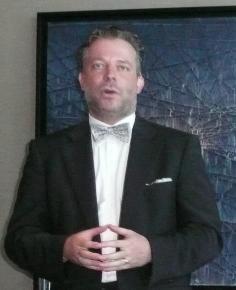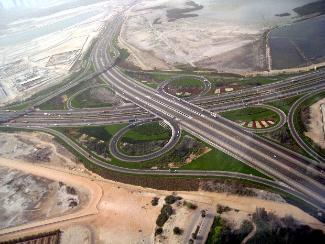German Industry & Commerce Office: Europeans totally misjudge Dubai
 |
Dubai (May 23, 2008). "Destination Dubai" - this buzzword comes with a vibrato - from drilling noise to hotel opening fanfares. The participants of the first hospitalityInside readers' trip called "hospitality inside Dubai" were confronted with the contrasts of the boom city on the Arabian Gulf on the first day of the trip: from the luxurious Harbour Hotel right in the middle of the huge construction site of Dubai Marina (photo) to the artificial winter sports world of Ski Dubai, then on to the world-class architecture of the Four Seasons Golf Club House, and to the old part of town at the Creek to get a feeling for the past, and finally to muse about all the impressions during a "Fine Dining Cruise" on the Creek. Oliver Parche, Vice Delegate of the German Industry & Commerce Office in Dubai spoke about Dubai's boom and the misjudgements of the Europeans providing a thematic introduction to the region.
Oliver Parche has been living in the Middle East for seven years. He has been working for the foreign branch of the German Industry & Commerce Office (www.ahkuae.com) for three years now. His speech called "Mission possible" highlighted the current economic and everyday situation of Dubai. Accordingly, the Emirates are considered one of the most liberal economies in the Arabian world. Its image shines all over the world, but the per capita income only reaches the level of Spain, while productivity only reaches the level of Malta, said Parche putting an end to false images of "rich sheikhs on the streets".
As every other major city, Dubai is struggling with permanently rising rents the state wants to keep at a 7% maximum per year, while they may actually reach about 40%. Currently, Dubai is struggling with inflation - its currency, the Dirham, is bound to the US dollar. But the positive aspects of the city are predominant: each hour 33 new people arrive at Dubai with a valid work contract. Two million people from more than 180 nations live in Dubai today; only 8% of them come from the Emirates.
Mr Parche, what German/European judgements do you consider the biggest misjudgements with respect to Dubai?
Oliver Parche: The Europeans are usually blinded by media reports displaying a false image of Dubai according to the motto of "money is on the street there..." Although Dubai marketing tries to convey this feeling, reality is entirely different. Dubai considers itself a city in a worldwide competition, which is true, and not in a primary competition with neighbouring countries - as in Europe. The Germans often overestimate their mostly regional view of the world and therefore tend to misjudge Dubai.
 |
| Oliver Parche, Deputy Delegate German Industry & Commerce Office Dubai. photo: map |
Why do the people living and working in Dubai believe in this phenomenal upswing and the future of the city?
Parche: They all live the vision expressed by Sheikh Mohammed bin Rashid Al Maktoum, their leader. This vision is simply being realised. In Germany, things are always only developed, but it takes a long time until realisation. That is the difference. This is exactly why so many intelligent people from all over the world come to Dubai. There are no sceptics. People here live and experience what is said.
How would you describe the attitude business people have towards economic risks in Dubai?
Parche: Of course they assess economic risks. But there is no such thing as the typical German question of "What if (something doesn't work out as planned)..." Here, people believe in their capability of solving issues. First, things are done - e.g. many new buildings. And should any problems arise, they are solved. The special location of Dubai on the world map makes this construction boom possible. The next step will be to fill the city with life. And this works: as soon as apartments are put on sale, they are bought away from the market. Dubai's strategy works out, not only in terms of construction.
Tourists see giant construction sites in Dubai. What sectors or factors are the city's main powerhouses?
Parche: They are clearly trade, finance, trade fairs and conferences. Dubai is a hub for decisions. Decision makers meet here. London, for example, is currently losing its importance as a financial centre to Dubai. This city can be compared best with Hong Kong or Singapore.
Is Dubai a role model for economic development in the Middle East? How do other Emirates or Arabian states try to distinguish themselves from Dubai?
Parche: Yes, Dubai is a role model, a kind of lighthouse for the Middle East. The other states, however, do not aim at copying the concept. Dubai is becoming a service centre. Abu Dhabi, however, will be able to attract more industry, as the city provides a lot more space. Furthermore, Abu Dhabi concentrates more on culture. But there is no real competition between the seven Emirates - Dubai, for example, wanted to have the Formula 1 race track, but it left it to Abu Dhabi in the end. Sharjah, for example, will be concentrating more on education in future. Other Arabian states like Saudi Arabia are struggling to distinguish themselves from Dubai.
When do Europeans fail in Dubai?
Parche: They fail when they come with neither time nor money. It takes an average of one to two and a half years until a business is started.
How vivid is the economic relationship between Europe and Dubai?
Parche: Highly vivid in fact, particularly since a strategic alliance was created by the leader of Abu Dhabi and Germany's former chancellor Gerhard Schroeder. For the Emirates, Germany is the gate leading to Europe, just as UAE is the gate to the Middle East. Above all, Germany could become one of the big economic winners should it be ready for cooperation.
 |
| Dubai, one big sand-box: The road networks is always developped first. photos (2): C. Markus-Diedenhofen |
What should companies do when they are unsure of whether to enter business relationships with Dubai or not?
Parche: They should inform themselves thoroughly and see the region with their own eyes. The Industry & Commerce Office makes an important contribution with its extensive service programme.
What kind of companies/industries and occupations have the best opportunities in Dubai today?
Parche: Trade and logistics companies have good opportunities, as well as banks, tourism businesses with strong service and good professional training capabilities, hotel managers as well as manufacturers and providers of medical products and medical services. Correspondingly, Dubai requires well-trained employees from Europe on the middle management level, e.g. physicians and senior nurses, bankers and tourism managers. In Dubai, the people required for executing the tasks come from Asia instead.
How realistic do you consider the development of tourism in Dubai and its prognosis?
Parche: Each prognosis, no matter how ambitious, has been exceeded up to now.In the long run, the influx of tourists from Europe will stagnate or even drop. But Europe is not Dubai's primary target market. It's the GCC (Golf Cooperation Council) states. These people from Arabia and individual countries in Africa and Asia are happy to see or experience a copy of the Eiffel Tower or Disneyland. They are fascinated - and even more so when they have the opportunity to experience these things in a familiar environment.
To print this article you have to be registered and logged in for newsletter, visitor or subscription.





